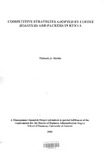| dc.description.abstract | Roasting and packing of coffee in Kenya has recently witnessed dramatic changes that
have affected the state of competition. This study sought to determine the competitive
strategies adopted by coffee roasters and packers in Kenya, and to establish the
challenges faced by them in initiating competitive advantages and applying strategies so
formulated. The study targeted the registered coffee roasters and packers in Kenya.
Response was received from 14 out of the targeted 23 companies thus constituting a
response rate of 61%.
The data was collected with the help of a semi-structured questionnaire. The data was
then analyzed by use of statistical spreadsheets and presented in the form of percentages,
frequencies, mean and standard deviation tables.
The local roasters and packers for coffee have adopted in general the five generic
strategies, namely, cost leadership, differentiation, best-cost provider, cost focus and
differentiation focus. However, it is notable that 50% of the firms have been inclined to
use best-cost provider strategies. These work best where the customer makes product
differentiation the norm and is sensitive to price and value. There is however, deliberate
attempt to segment the market into specific offering, and thus focus strategy is apparent
with the players who have curved a niche for themselves.
Overall, most coffee roasters and packers in Kenya have performed well. The success in
sale of roasted coffee has been achieved due to development of strategies that meet the
market requirements. Key challenges faced by the firms were identified as financial
requirements, keeping abreast of changing consumer tastes and preferences, barriers to
enter and exit the industry, ability and skills of shareholders, ability and skills of staff,
marketing of the product, and competition from non-branded firms. Government
intervention and erratic provision of utilities were also mentioned as key challenge areas.
These challenges have been resolved in differing extents in attempts to stay abreast in the
competitive market. | en |

